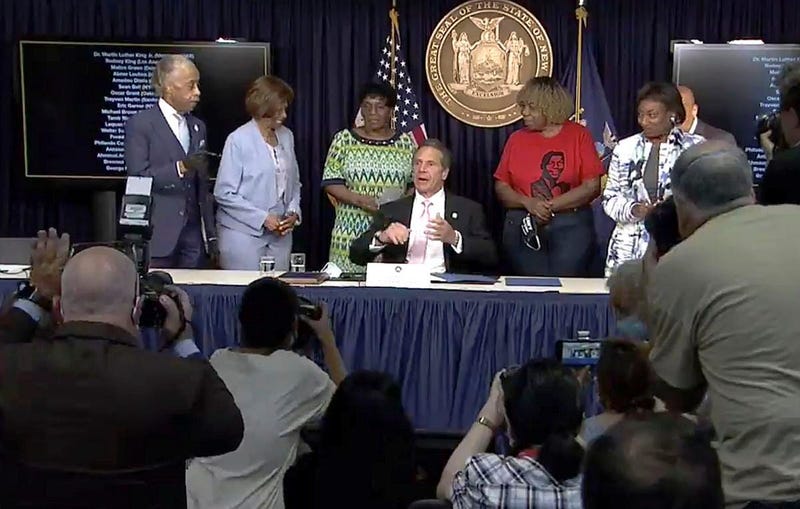
"Moving forward there is still more to do, and we're going to do it in the State of New York," said Cuomo. "The truth is this: police reform is long overdue, and Mr. Floyd's murder is just the most recent murder. This is not just about Mr. Floyd's murder - it's about being here before many, many times before...
"We're not going to fund police agencies in this state that do not look at what has been happening, come to terms with it, and reform themselves," Cuomo said later in his press conference. "We're not going to be, as a state government, subsidizing improper police tactics - we're not doing that."
"Sometimes, out of very bad circumstances, good things happen," said Peoples-Stokes. "I think because of the experiences we all have seen, not just in New York State, not just in America but across the world, how people feel about law enforcement being able to protect their performance on the job is not the thing of the future, so I'm glad we were able to repeal it."
The original intention of the law was to prevent criminal defense attorneys from subjecting officers to cross-examinations about irrelevant information in their personnel file, and that's what Buffalo PBA President John Evans is afraid of.
"We're disappointed that it was dismantled," said Evans. "The concern here is really a societal concern in that what we don't want to see is police officers' disciplinary records become the focal point of trial. If the individual is on trial, and rightfully so - he should be convicted - again, we don't want to see that because an officer may have had a couple of scrapes with departmental issues, that it would somehow be a detriment to his ability to testify."
"It was a long time coming, but it came,” Carr said.
Senate Majority Leader Andrea Stewart-Cousins thanks Carr and Bell "for being brave and strong.”
“We are at a moment of reckoning. There is no doubt about it,” she said.
The laws will ban police chokeholds, like the one used on Garner, make it easier to sue people who call police on others without good reason, and set up a special prosecutor’s office to investigate the deaths of people during and following encounters with police officers.
“These bills mean some substantive change, so that we won’t be sitting here going over this after the next funeral and after the next situation,” Sharpton said.
Some bills, including body camera legislation, drew support from Republicans, who opposed legislation that repealed a state law long used to block the release of police disciplinary records over concerns about officers' privacy.
Eliminating the law, known as Section 50-a, would make complaints against officers, as well as transcripts and final dispositions of disciplinary proceedings, public for the first time in decades.
And the state's approximately 500 police departments will all have to come up with plans to address everything from use of force to implicit bias awareness training by next April under an executive order that Cuomo said he will issue Friday.
The governor said New York is the first to come up with such a plan and warned that police departments who fail to do so will not receive state aid.
Cuomo has 10 days to act on other bills passed by lawmakers this week, including legislation prohibiting police from using racial profiling and another bill ensuring that individuals under arrest or in policy custody receive attention for medical and mental health needs.
Lawmakers also passed a bill to require New York to collect and report the race and other demographic details of individuals who are charged. The legislation says police departments must “promptly report” to the state the death of any people who die in police custody and in an attempt to establish custody, and provide a demographic breakdown.
During this week’s legislative debates, many lawmakers relayed their personal experiences with police.
On Friday, Stewart-Cousins, who is the first black woman to lead the state Senate, said her youngest son was once stopped and frisked when he was 18 and said he ended up with a fractured nose. “Thank God I was able to bring him home,” she said.
“Every parent, every mother who looks like me understood that scary notion with our kids, with our husbands, with our brothers,” she said.
Assembly Speaker Carl Heastie said he’s had “not-so-positive” interactions with the police — from when he was young and even now as legislative leader.
“Growing up when you heard the stories of Anthony Baez and Sean Bell and Eric Garner, as a black man, I felt that could be me,” Heastie said.
